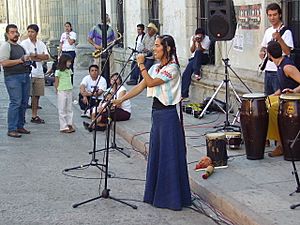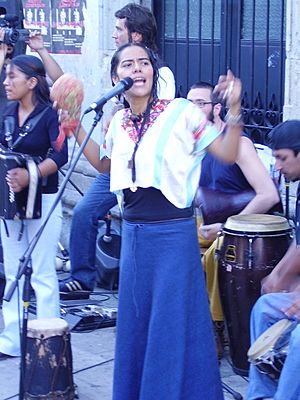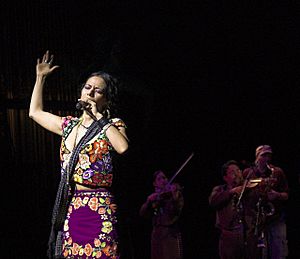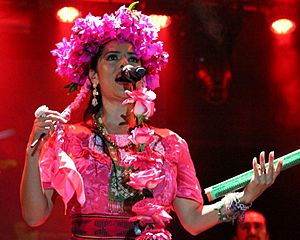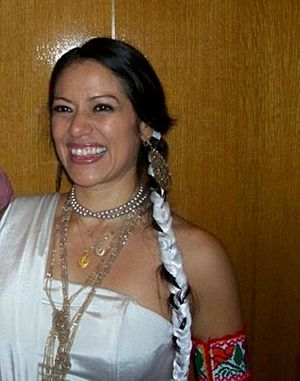Lila Downs facts for kids
Quick facts for kids
Lila Downs
|
|
|---|---|
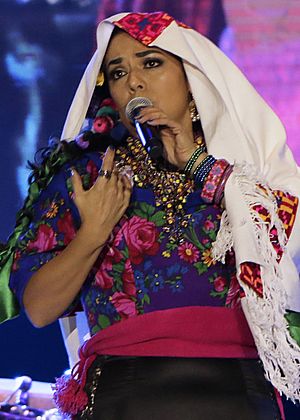
Downs performing in Mexico (2018)
|
|
| Background information | |
| Birth name | Ana Lila Downs Sánchez |
| Born | 9 September 1968 |
| Origin | Tlaxiaco, Oaxaca, Mexico |
| Genres | |
| Instruments |
|
| Years active | 1990–present |
| Labels | |
Ana Lila Downs Sánchez (born September 9, 1968), known as Lila Downs, is a famous Mexican singer and songwriter. She is known for mixing traditional Mexican music with modern sounds. She sings her own songs and songs by other artists in many different styles.
Downs is proud of her Mexican heritage. She often includes the music and languages of Mexico's indigenous (or native) people in her work. She has recorded songs in languages like Mixtec, Zapotec, and Nahuatl.
Born in Oaxaca, Mexico, she studied music and later decided to focus on her singing career. Her first album, Ofrenda, came out in 1994. She became well-known in 1999 with her album La sandunga. She gained fans around the world with her 2001 album Border.
Downs is also known for her unique fashion, which is inspired by the colorful clothing of Mexico's indigenous cultures. She has won many awards for her music, including one Grammy Award and three Latin Grammy Awards. Besides music, she is an activist who works to help people, especially the indigenous communities of Latin America.
Contents
Early Life and Education
Lila Downs was born in Tlaxiaco, Oaxaca, Mexico. Her mother, Anita Sánchez, was a Mixtec singer. Her father, Allen Downs, was a Scottish-American art professor and filmmaker from Minnesota.
From a young age, Lila loved music. When she was eight, she started singing traditional Mexican songs called rancheras. At 14, she moved to the United States with her parents. There, she studied singing in Los Angeles and learned to speak English. After her father passed away when she was 16, she and her mother returned to their hometown in Mexico.
A powerful moment in her life happened while she was working in a store. A man asked her to translate his son's death certificate. She read that the young man had died trying to cross the border into the U.S. This sad story deeply affected her and has inspired much of her music about the lives of immigrants.
For a time, Downs felt unsure about her indigenous background. She once said, "I was embarrassed to have Indian blood." To find herself, she took a break from college and traveled. Eventually, she returned to Oaxaca and worked in her mother's store. It was there she met Paul Cohen, a saxophone player who would become her husband and musical partner.
Downs later finished her studies. She studied Anthropology at the University of Minnesota and also attended the Institute of Science and Arts of Oaxaca.
Beginning a Music Career
When Lila Downs was 25, she and Paul Cohen started making music together. She joined a band and began performing in both Minnesota and Oaxaca.
In Minnesota, she formed a group called La Trova Serrana. The group became popular with the local Latin community. They sang songs about the culture and values of the Zapotec people.
When she returned to Mexico, she sang in cafes and clubs in the city of Oaxaca. She also performed in Philadelphia and California. Her powerful voice and unique style earned her good reviews, which encouraged her to tour across Mexico.
Rise to Fame
1994–1999: First Albums and La Sandunga
In 1994, Downs released her first album, Ofrenda. It included traditional songs from Oaxaca and some she wrote herself. The songs were in Spanish, Mixtec, and Zapotec. Since it was an independent album, it wasn't a big commercial hit.
In 1999, she signed with a record label and released La Sandunga. This album was a huge success. It blended traditional Mexican music with modern styles like jazz and blues. The album made her famous in Mexico, the United States, and Europe, selling over 500,000 copies.
2000–2003: Tree of Life and Border
Her next album, Tree of Life (2000), explored her indigenous roots even more. It used pre-Hispanic instruments and songs in native languages.
In 2001, she released Border. This was her first album with songs in English as well as Spanish and Mayan. The album talked about important social issues like immigration and the struggles of indigenous people. It was popular on world music charts but also caused some debate because of its strong political messages.
2004–2008: One Blood and La Cantina
One Blood (Una Sangre) was released in 2004 and became one of her most successful albums. The songs were about migration and justice. The album included traditional songs like "La Bamba" mixed with rock and folk music. In 2005, it won a Latin Grammy for "Best World Music Album."
Her 2006 album, La Cantina, was inspired by Mexican ranchero music. It featured her most famous song, "La cumbia del mole". The song is about making mole, a traditional Mexican sauce, and became a hit in many countries.
2008–Present: Continued Success
In 2008, Downs released Ojo de Culebra (Eye of the Snake). The album mixed rock, cumbia, and flamenco, and featured collaborations with other famous artists.
Her 2011 album, Pecados y Milagros (Sins and Miracles), was a huge hit. It reached number one on the Billboard Top Latin Albums chart. The album was inspired by the challenges and faith of everyday people in Mexico.
Downs has continued to release successful albums, including Balas y Chocolate (2015) and Salón, Lágrimas y Deseo (2017), which also won a Latin Grammy. She often collaborates with other artists. In 2014, she worked with singers Soledad Pastorutti and Niña Pastori on the album Raíz, which won a Latin Grammy for Best Folk Album.
Acting and Soundtracks
Lila Downs has also appeared in movies. She had small roles in films like Frida and Mariachi Gringo.
Her music is often featured in movie soundtracks. For the film Frida, she sang "Burn It Blue," which was nominated for an Academy Award. She has also contributed songs to films like The Three Burials of Melquiades Estrada, Real Women Have Curves, and Tortilla Soup.
Personal Life and Activism
Lila Downs was married to her musical partner, Paul Cohen, for many years. He was her artistic director and supported her career from the beginning. In 2010, they adopted a son, Benito Dxuladi. The family lived in both Oaxaca and Mexico City. Sadly, Paul Cohen passed away in December 2022.
Downs is a dedicated social activist. She uses her music to bring attention to important issues, especially the rights and culture of indigenous people. She sings with pride about her home state of Oaxaca and celebrates her Mixtec heritage. When asked if she is a politician, she says she is not interested in power but wants to create positive change through her music.
Awards and Recognition
Throughout her career, Lila Downs has won many awards for her music, including a Grammy Award and five Latin Grammys. In Mexico City, she has a star on the Walk of Fame outside the Auditorio Nacional to honor her achievements.
Her album Balas y Chocolate was named one of the best world music albums of 2015 by iTunes and The Sunday Times in the UK. In 2019, the Latin Recording Academy honored her with the Leading Ladies of Entertainment award for her contributions to music.
Discography
- Ofrenda (1994)
- Azulao: En vivo con Lila Downs (1996)
- La Sandunga (1999)
- Tree of Life (Yutu tata) (2000)
- Border (La Línea) (2001)
- One Blood (Una sangre) (2004)
- La Cantina (2006)
- The Very Best Of/El Alma de Lila Downs (2008)
- Shake Away (Ojo de Culebra) (2008)
- Lila Downs y La Misteriosa en Paris – Live a FIP (2010)
- Pecados y Milagros (2011)
- Balas y Chocolate (2015)
- Salón, Lágrimas y Deseo (2017)
- Al Chile (2019)
- La Sánchez (2023)
See also
 In Spanish: Lila Downs para niños
In Spanish: Lila Downs para niños
- List of Mexican actresses
Images for kids
 | Jessica Watkins |
 | Robert Henry Lawrence Jr. |
 | Mae Jemison |
 | Sian Proctor |
 | Guion Bluford |


